Perspectives: No Excuse for Inaction

The smarter way to stay on top of broadcasting and cable industry. Sign up below
You are now subscribed
Your newsletter sign-up was successful
It is time for congress to step in and clarify what authority the government has to regulate broadband, in terms of both access to it and how the information on it is treated by powerful edge providers.
We don’t know where that process will lead, but there currently is no solid regulatory footing from which to launch the 5G-driven, “internet of things” world.
Sen. John Thune (R-S.D.) has renewed his offer for legislation that prohibits blocking, throttling and paid prioritization. That would appear to give Democrats and activists most of what they want, but the sticking point appears to be the fear that such legislation confines the FCC’s regulatory authority only to those areas. That is too narrow an approach for Democrats to sign up for, one high-level Hill staffer said.
Thune’s proposal would also take regulation under Title II common-carrier rules off the table. Some activists have said that means it is a table at which they won’t be bargaining.
Broadband regulation encompasses an incredibly complex set of issues implicating content regulation, the definition of access as geography and affordability, privacy and national security, to name only a few. It is hard to argue that high-speed internet access is not a necessity on the order of phone or water or gas or electricity. But it’s not simply a utility, either. It is an expressive medium, a social medium and a vehicle for everything from connected cars to connected nuclear power plants.
In short, there is no precedent for it in human history, and no precedent for how to treat it from a regulatory standpoint.
The government may have to treat internet access like eminent domain, by which we don’t mean take it over, but concede that it may have to do some things that might not seem fair but are in the interests of society as a whole. Depressing investment and deployment, or regulating content, are not in society’s interests.
The smarter way to stay on top of broadcasting and cable industry. Sign up below
Regulating edge providers and social media sites is no longer a matter of nipping Facebook or Twitter or Google in the bud. They have long since flowered and spread seeds and taken over the virtuous garden, as it were.
Needless to say, this is all worth thinking hard about. And while we have always opposed government content regulation, things like sex trafficking and “deep fakes,” or digitally doctored videos, may be the web equivalent of shouting fire in a crowded theater. Speech protections are not absolute, any more than one’s fist may extend to the territory beyond someone else’s nose.
But whatever the answers are, Congress needs to back off from its entrenched positions and come to the table to actually talk about what should and should not be done — and then do something.
“No blocking” and “no throttling of internet access and content” should be no-brainers, as should “no anticompetitive paid prioritization.” Prioritization as a service differentiator is more of a gray area, but will become less so when 5G blooms and establishes beyond doubt that there are robust alternatives.
It would be dereliction of duty for Congress to continue to operate at the political poles — not to mention polls — on this issue rather than find a middle ground that neither side may love but the country needs.
